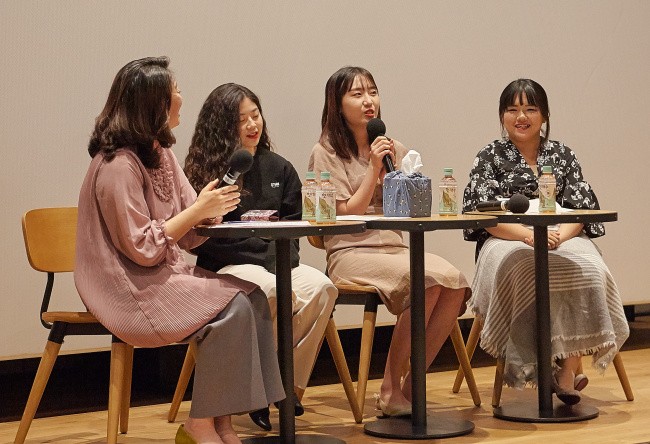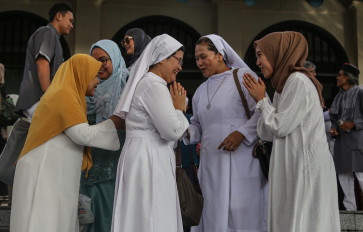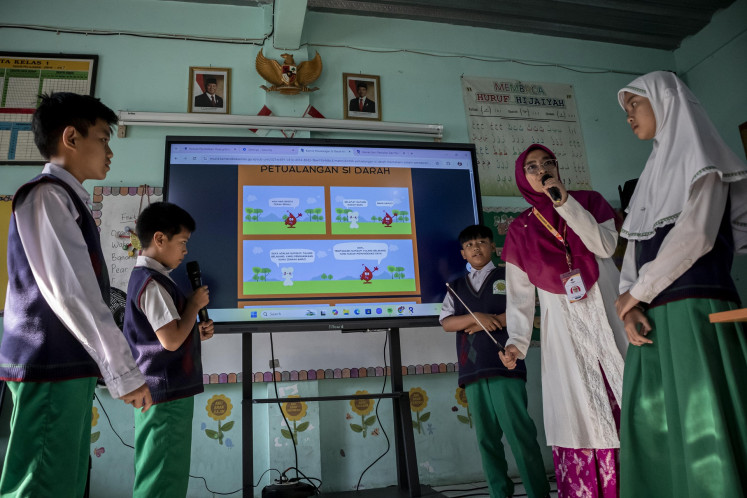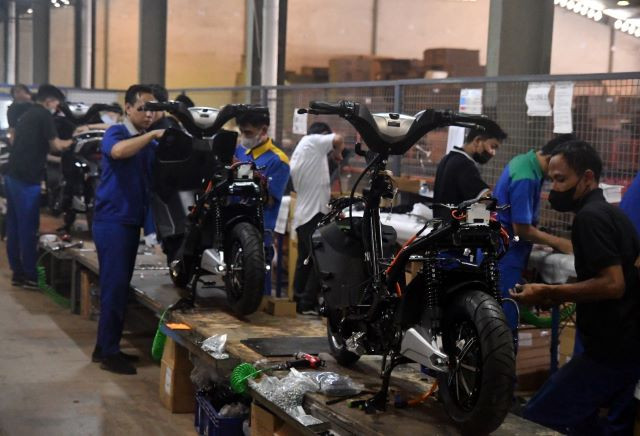Unwed Korean teen mothers turn their experiences into musical
Six mothers, most of whom became parents as unwed teens, participate in an upcoming musical, titled “HeShe Tag,” which features their own experiences of motherhood.
Change text size
Gift Premium Articles
to Anyone
 Kim Myung-ji (second from right) and other unwed mothers speak about upcoming musical 'HeShe Tag', based on their experiences as teenage single mothers, at a public event in central Seoul on Oct. 1. (CJ Welfare Foundation/The Korea Herald/-)
Kim Myung-ji (second from right) and other unwed mothers speak about upcoming musical 'HeShe Tag', based on their experiences as teenage single mothers, at a public event in central Seoul on Oct. 1. (CJ Welfare Foundation/The Korea Herald/-)
W
hen Kim Myung-ji became pregnant at age 19, she was told by many -- including her close friends -- that her life was “virtually over.” She hadn’t finished high school, had never been married, and her family did not have much money -- she chose to keep the baby, regardless.
“In spite of all this, I didn’t think having this baby meant my life was practically over. I never felt sorry for myself,” Kim, now 20, said at a recent public event in central Seoul.
“It was rather disheartening to see how others perceived me and my life post-pregnancy. It seemed like they were genuinely feeling sorry for me, and that (as an unwed, teen mother), I was going to struggle with and suffer from the stigma for the rest of my life.”
Kim is one of the six mothers, most of whom became parents as unwed teens, participating in an upcoming musical, titled HeShe Tag, which features their own experiences of motherhood. They are to play characters based on themselves in the show, re-living their past onstage and telling their stories.
“The experience has been, among other things, empowering,” Kim said. “There is something empowering about sharing your own story and thereby helping others. That’s what I ultimately want to do -- helping more unwed mothers who went through what I went through as a teenager.”
Read also: Mothers in Japan face hurdle after hurdle in returning to work
Alarming statistics
Single motherhood -- especially unwed motherhood -- remains a subject of heavy social stigma and discrimination in today’s South Korea. Teen mothers, in particular, often face harsher realities as teen pregnancies are still largely considered a taboo, as well as a disgrace to the mothers' family.
According to a recent study by the Korea Population, Health and Welfare Association, which surveyed some 359 unwed mothers in April, more than 60 percent of the respondents said they were unable to get medical care due to their low income.
More than 80 percent of the mothers said they were “criticized” by others for raising their child without a spouse, while 70 percent said they have suffered depression at least once due to stress related to child care.
All of the surveyed women on average were making 923,000 won a month ($823), much lower than the average monthly earnings of working Koreans -- 3.29 million won.
Still, only 11.7 percent of the surveyed mothers were receiving child support from the biological fathers of their children; failing to pay child support is currently not a criminal offense in South Korea.
Fighting stigma
Choi So-mi, who became pregnant some eight years ago, only decided to keep her baby because the father of the child, who was her boyfriend at the time, promised that he would support the baby.
But he abruptly cut contact with her when she was seven-months pregnant. Her father and sister had been telling her to abort the baby. Choi was devastated.
“My mother died when I was young, and neither my father nor sister had been supportive of my decision (to keep the baby),” the 27-year-old mother said.
“I was so scared I locked myself in my room and refused to speak to anybody. When my son was born, I remember feeling angry because even as a newborn, he resembled so much of his father. I thought, his father is not going to be in his life any way, he might as well have looked like me.”
Choi said she struggled because of the stigma and prejudice. It was often difficult to get a job because many refused to give her an offer after learning that she is single but has a son. One of her employers told her not to tell her colleagues that she’s an unwed mother.
A few years ago, one of her close friends’ father sexually assaulted her. She took the case to court and won, but said she fell into depression because of the experience. “At the court, he said, I was a lonely single mom (who needed men’s attention), and that is why he was seduced by me,” she said.
“I was speechless. I don’t know how and why anyone would think if you are an unwed mother, you would automatically be ‘lonely’. I lost all of my friends because my friend, whose parent assaulted me, spread false rumors about me and her father. I became severely depressed at the time, and at one point, ended up almost neglecting my own son.”
Read also: Survival guide for modern mothers
Joys and hopes
But motherhood hasn’t always been about struggles. Sometimes there were moments of pure joy. Kim, who has been staying at a shelter and mostly relying on welfare allowance, bought her son clothes for the first time when he was 13 months old.
“I dressed him in it and took him out to an outdoor playground. He looked so adorable in it -- it made me so happy,” she said. “I had been saving money to buy him this. I was happy that I was able to give him something with the money that I earned.”
Kim, who hopes to become a social worker one day, said her mother -- who is also a single parent -- gave her the courage that she needed when she was pregnant.
“My parents got divorced when I was young and my mother, who is strong and driven, did her best to raise me and my sibling on her own,” she said. “And I am the daughter of this strong, inspirational woman. Knowing that, I felt like I had what it takes to raise a child.”
Choi, on the other hand, recalled the dream she had after the father of her baby cut off contact.
“My late mother appeared (in my dream) and told me, you should just give your baby your constant, ceaseless care, and that would be enough,” she said.
“And that’s why I named my son Han-gyeol, which means to be constant, to be unchanging.
“When I was struggling with depression after the court trial, there was a moment when my little son came up to me, out of the blue, looking at me in the eye, and said, ‘Mommy, I love you, I love you.’ That‘s when I found the courage to live again.”
The musical HeShe Tag runs from Oct. 18-20 at CJ azit DAEHAKNO in central Seoul.
This article appeared on The Korea Herald newspaper website, which is a member of Asia News Network and a media partner of The Jakarta Post









